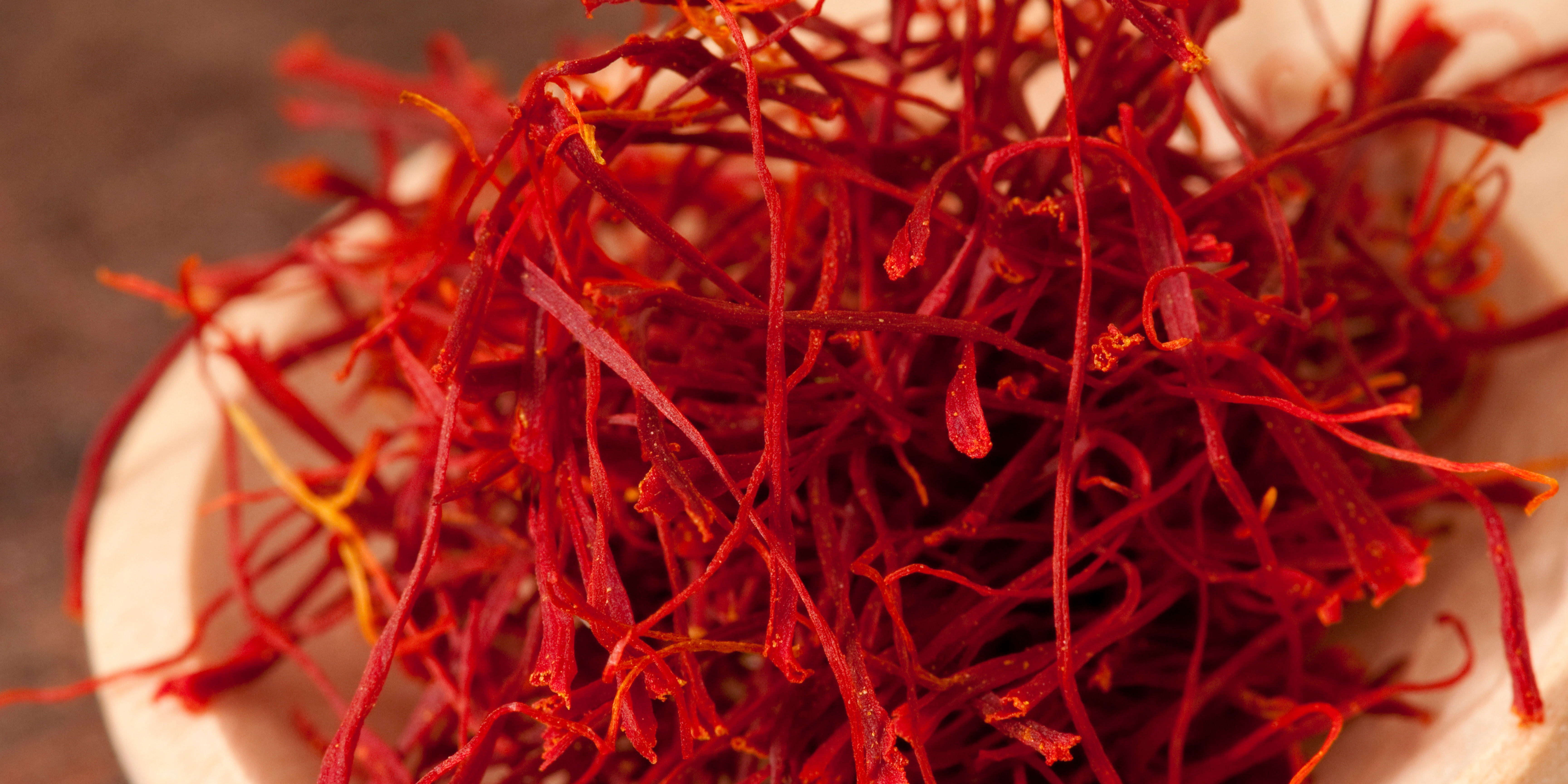
Herbs and spices have not only been used for adding flavour and colour to our meals but also hold many therapeutic properties and for centuries have been used as a form of medicine. Specific herbs and spices have been known to help with depression. Lions mane mushroom, Ginkgo Biloba and St Johns wort are a few herbs that have shown promise with depression but saffron is another one.
Saffron (Crocus sativus) is a plant. The dried thread-like parts of the flower (stigmas) are used to make saffron spice, food coloring, and medicine. It can take 75,000 saffron blossoms to produce a single pound of saffron spice. Saffron is largely cultivated in Iran and harvested by hand. It’s one of the world’s most expensive spices.
Saffron has been used for centuries to strengthen digestion, support menstruation, improve mood, increase relaxation and depression. In many clinical trials, the therapeutic effect of saffron, has shown to be as effective as antidepressants (including fluoxetine, imipramine, and citalopram). In fact, multiple studies indicated that saffron is even more effective than antidepressant drugs.
What Does the Research Say?
Saffron could be an appropriate medication treatment for mild to moderate depression, with fewer reported side effects, compared to standard drugs (1,2,3,4). One study found that saffron supplements improved mood and reduced symptoms of major depressive disorder more than placebo supplements (5).
Studies have also shown saffron to be an effective antidepressant in mild to moderate cases of depression. Chemicals contained in the herb increase serotonin levels in the brain, thus improving overall mood and motivation (6).
In a six weeks study, 40 depressed persons took 30 mg of saffron twice a day, and the second group took a placebo. The result of these clinical trial showed that saffron threads (stigma) positively affect the depression rating scale and accelerated recovery and helped to control the side effects of antidepressant drugs.
One study compared the efficiency of saffron versus imipramine in the treatment of depression. In this trial, patients received saffron (30mg/day), and the second group received imipramine (100 mg/day) for six weeks. The results showed that the saffron in this dose has equal or even higher efficiency than imipramine.
Saffron may safely and effectively improve some of the fluoxetine-induced sexual problems, including arousal, lubrication, and pain (7).
Recommended Dosage
30mg a day one to two times a day (8). Saffron is generally very expensive because many plants are needed to make a tiny amount of the spice. Therefore, saffron supplements aren’t easy to find, and they can also be costly.
Side Effects
If you take too much saffron, it may cause side effects like anxiety, appetite changes, upset stomach, vomiting, dizziness, diarrhea, sleepiness, and headache. Some people are also allergic to saffron.
Warning
Saffron may trigger mood swings in people with bipolar disorder. Women who are pregnant or breastfeeding should not use saffron. When used as a supplement, saffron may cause problems for people on blood pressure medicine or blood thinners (9).
Summary
Research supports the role that Saffron can play a role in the treatment for depression and has been seen as effective as some antidepressants and help offset the side effects of some anti-depressants.
But if you are interested in looking at alternatives to taking antidepressant medication then we have what you are looking for. Koru Nutrition has created an evidence based online nutrition and lifestyle program with strategies to help prevent, address and manage depression for you, your loved one or a client. Reclaim Your Happiness online nutrition and depression program provides practical, user friendly strategies and recommendations. This includes exploring various herbs, vitamins, minerals, key amino acids, specific foods, and eating patterns and how to incorporate it into your day-to-day life. It references over 300 studies and also includes a recipe book. For more information on this check out Reclaim your Happiness program
References
- Singletary K:Saffron: Potential healthbenefits. Nutrition Today 2021, 55(6):294-303.
- Shafiee M,Arekhi S, OmranzadehA, Sahebkar A: Saffronin the treatment ofdepression, anxiety and othermental disorders: Currentevidence and potential mechanisms of action. J Affect Disord 2018, 227:330–337. 12. Clinical Applications of Saffron (Crocus sativus ) and its Constituents : A Review. 2015, 287–295.
- Dai L, Chen L, Wang W: Safety and Efficacy of Saffron (Crocus sativus L.) For Treating Mild to Moderate Depression: A Systematic Review and Meta-analysis. JNerv Ment Dis 2020, 208(4):269-276.
- Lopresti AL, Drummond PD: Saffron (Crocus sativus) for depression: a systematic review of clinical studies and examinationof underlying antidepressant mechanisms of action 2014, 517–527
- https://pubmed.ncbi.nlm.nih.gov/24299602
- https://www.ncbi.nlm.nih.gov/books/NBK292058/
- https://pubmed.ncbi.nlm.nih.gov/23280545/
- https://kohanrishe.net/saffron-for-depression/
- https://www.webmd.com/vitamins-and-supplements/saffron-uses-and-risks#:~:text=Side%20effects.,are%20taking%20medication.





